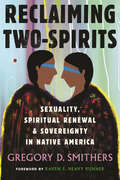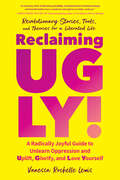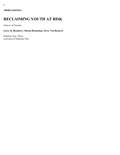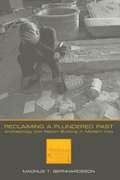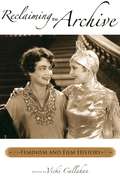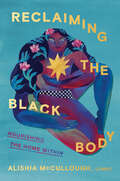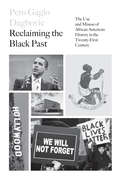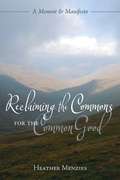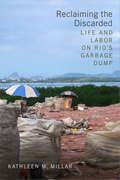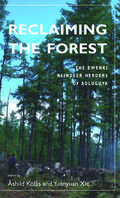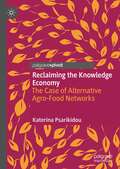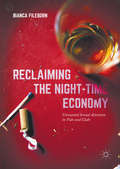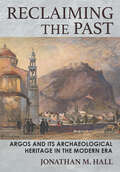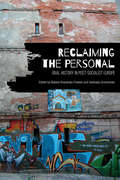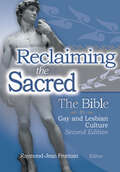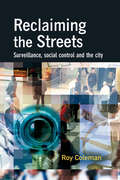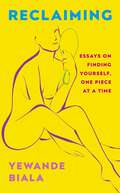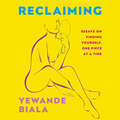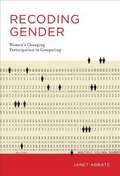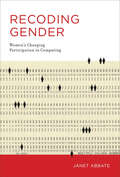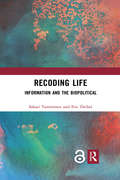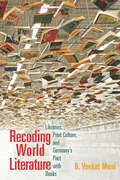- Table View
- List View
Reclaiming Two-Spirits: Sexuality, Spiritual Renewal & Sovereignty in Native America (Queer Ideas/Queer Action #10)
by Gregory D. SmithersA sweeping history of Indigenous traditions of gender, sexuality, and resistance that reveals how, despite centuries of colonialism, Two-Spirit people are reclaiming their place in Native nations.Reclaiming Two-Spirits decolonizes the history of gender and sexuality in Native North America. It honors the generations of Indigenous people who had the foresight to take essential aspects of their cultural life and spiritual beliefs underground in order to save them.Before 1492, hundreds of Indigenous communities across North America included people who identified as neither male nor female, but both. They went by aakíí&’skassi, miati, okitcitakwe, or one of hundreds of other tribally specific identities. After European colonizers invaded Indian Country, centuries of violence and systematic persecution followed, imperiling the existence of people who today call themselves Two-Spirits, an umbrella term denoting feminine and masculine qualities in one person.Drawing on written sources, archaeological evidence, art, and oral storytelling, Reclaiming Two-Spirits spans the centuries from Spanish invasion to the present, tracing massacres and inquisitions and revealing how the authors of colonialism&’s written archives used language to both denigrate and erase Two-Spirit people from history. But as Gregory Smithers shows, the colonizers failed—and Indigenous resistance is core to this story. Reclaiming Two-Spirits amplifies their voices, reconnecting their history to Native nations in the 21st century.
Reclaiming UGLY!: A Radically Joyful Guide to Unlearn Oppression and Uplift, Glorify, and Love Yourself
by Vanessa Rochelle LewisFlip the script on how you think about UGLY--what it means, what it is, and how to reclaim it to Uplift, Glorify, and Love Yourself in an uglified world.Blending joyful self-help magic with incisive social analysis and personal narrative, Vanessa Rochelle Lewis empowers readers to heal, connect, and revolt against uglification.Uglification is "ugly" weaponized: a tool, ideology, and type of oppression that designates some bodies as more or less worthy of love, respect, access, and dignity. It defines who's accepted in what spaces, which identities are marginalized, and how we all move through the world--and is part and parcel of systems like white supremacy, ableism, sizeism, sexism, and queer- and transphobia. Here, Lewis takes on uglification, showing us how reclaiming UGLY is a subversive act that roars an unapologetic "yes!" to joy, healing, and community-building in a world that's engineered to hold us back.Lewis asks us to go beyond analysis, inviting us to boldly perform UGLY as an act of rebellion, liberation, and radical self-love. Through self-help exercises, reflective meditations, and lesson plans, Lewis moves us closer to a collective liberation that takes back what society tells us is ugly and taboo...and teaches us to deconstruct what we've told ourselves is ugly and taboo. In sharing her analysis, personal journey, and activity toolkit, Lewis offers a warm embrace and compassionately guides us toward lives of radical self-acceptance, joyful community-centered healing, and unfiltered self-love.
Reclaiming Youth At Risk: Futures Of Promise (reach Alienated Youth And Break The Conflict Cycle Using The Circle Of Courage)
by Larry K. Brendtro Martin Brokenleg Steve Van BockernEmpower your alienated students to cultivate a deep sense of belonging, mastery, independence, and generosity. This fully updated edition of Reclaiming Youth at Risk by Larry K. Brendtro, Martin Brokenleg, and Steve Van Bockern merges Native American knowledge and Western science to create a unique alternative for reaching disconnected or troubled youth. Rely on the book's new neuroscience research, insights, and examples to help you establish positive relationships, foster social learning and emotional development, and inspire every young person to thrive and overcome. Drive positive youth development with the updated Reclaiming Youth at Risk: Study the four hazards that dominate the lives of youth at risk: relational trauma, failure as futility, powerlessness, and loss of purpose. Learn how cultivating the Circle of Courage values of belonging, mastery, independence, and generosity can combat the four hazards. Explore a unique strength-based approach for reclaiming discouraged or alienated youth. Understand how to create a safe, brain-friendly learning environment and break the conflict cycle. Read personal accounts of individuals who have transformed student trauma into student resilience in schools through trauma-informed practice.
Reclaiming a Plundered Past: Archaeology and Nation Building in Modern Iraq
by Magnus T. BernhardssonThe looting of the Iraqi National Museum in April of 2003 provoked a world outcry at the loss of artifacts regarded as part of humanity's shared cultural patrimony.<P><P> But though the losses were unprecedented in scale, the museum looting was hardly the first time that Iraqi heirlooms had been plundered or put to political uses. From the beginning of archaeology as a modern science in the nineteenth century, Europeans excavated and appropriated Iraqi antiquities as relics of the birth of Western civilization. Since Iraq was created in 1921, the modern state has used archaeology to forge a connection to the ancient civilizations of Mesopotamia and/or Islamic empires and so build a sense of nationhood among Iraqis of differing religious traditions and ethnicities.
Reclaiming the Archive: Feminism and Film History
by Vicki CallahanReclaiming the Archive: Feminism and Film History brings together a diverse group of international feminist scholars to examine the intersections of feminism, history, and feminist theory in film. Editor Vicki Callahan has assembled essays that reflect a range of methodological approaches--including archival work, visual culture, reception studies, biography, ethno-historical studies, historiography, and textual analysis--by a diverse group of film and media studies scholars to prove that feminist theory, film history, and social practice are inevitably and productively intertwined. Essays in Reclaiming the Archive investigate the different models available in feminist film history and how those feminist strategies might serve as paradigmatic for other sites of feminist intervention. Chapters have an international focus and range chronologically from early cinema to post-feminist texts, organized around the key areas of reception, stars, and authorship. A final section examines the very definitions of feminism (post-feminism), cinema (transmedia), and archives (virtual and online) in place today. The essays in Reclaiming the Archive prove that a significant heritage of film studies lies in the study of feminism in film and feminist film theory. Scholars of film history and feminist studies will appreciate the breadth of work in this volume.
Reclaiming the Black Body: Nourishing the Home Within
by Alishia McCulloughAn essential exploration of the overlooked impact of disordered eating among Black women—and a prescriptive road map to returning to wholeness within our bodies, from the clinical therapist who founded Black and Embodied Counseling and Consulting PLLC&“Lights a radical path away from trauma and blame toward healing, self-acceptance and, ultimately, joy.&”—Linda Villarosa, author of Pulitzer Prize finalist Under the Skin: The Hidden Toll of Racism on Health in AmericaFood has always been a political tool for the oppressor—and the Black body has always been one of its many battlegrounds.Licensed mental health therapist, somatic healer, and eating disorder specialist Alishia McCullough understands that for far too many Black women, racial trauma&’s seismic impact has disrupted their most essential relationship: the one they have with their bodies—and by extension, with their food. African Americans are disproportionately impacted by disordered eating behaviors, yet their experiences are frequently neglected by doctors and mental health experts. As a result, our most vulnerable communities are forced to navigate systems primed to dismiss their needs, leaving them without proper care, or often even the language they need to identify what&’s wrong. McCullough&’s groundbreaking work radically validates the lived experiences and generational traumas of BIPOC communities. As part of a steadily growing movement among clinicians to &“decolonize therapy,&” her deeply affirming approach seeks to understand disordered eating patterns by examining the psychological wounds left by centuries of racism. Weaving together crucial history, compelling client stories, guided meditation, journal prompts, and McCullough&’s own journey with disordered eating behaviors, Reclaiming the Black Body offers readers a safe space to feel seen—and a powerful pathway to healing. This revealing, potentially life-saving book illuminates the way home, back to the safety and comfort found within our bodies.
Reclaiming the Black Past: The Use and Misuse of African American History in the 21st Century
by Pero G. DagbovieThe past and future of Black historyIn this information-overloaded twenty-first century, it seems impossible to fully discern or explain how we know about the past. But two things are certain. Whether we are conscious of it or not, we all think historically on a routine basis. And our perceptions of history, including African American history, have not necessarily been shaped by professional historians.In this wide-reaching and timely book, Pero Gaglo Dagbovie argues that public knowledge and understanding of black history, including its historical icons, has been shaped by institutions and individuals outside academic ivory towers. Drawing on a range of compelling examples, Dagbovie explores how, in the twenty-first century, African American history is regarded, depicted, and juggled by diverse and contesting interpreters—from museum curators to filmmakers, entertainers, politicians, journalists, and bloggers.Underscoring the ubiquitous nature of African-American history in contemporary American thought and culture, each chapter unpacks how black history has been represented and remembered primarily during the “Age of Obama,” the so-called era of “post-racial” American society. Reclaiming the Black Past is Dagbovie's contribution to expanding how we understand African American history during the new millennium.
Reclaiming the Commons for the Common Good
by Heather MenziesCommoning was a way of life for most of our ancestors. In Reclaiming the Commons for the Common Good, author Heather Menzies journeys to her roots in the Scottish Highlands, where her family lived in direct relation with the land since before recorded time.Beginning with an intimate account of unearthing the heritage of the commons and the real tragedy of its loss, Menzies offers a detailed description of the self-organizing, self-governing, and self-informing principles of this nearly forgotten way of life, including its spiritual practices and traditions. She then identifies pivotal commons practices that could be usefully revived today. A final "manifesto" section pulls these facets together into a unified vision for reclaiming the commons, drawing a number of current popular initiatives into the commoning frame, such as local food security, permaculture, and the Occupy Movement.An engaging memoir of personal and political discovery, Reclaiming the Commons for the Common Good combines moving reflections on our common heritage with a contemporary call to action, individually and collectively; locally and globally. Readers will be inspired by the book's vision of reviving the commons ethos of empathy and mutual respect, and energized by her practical suggestions for connection people and place for the common good.Heather Menzies is an award-winning writer and scholar and member of the Order of Canada. She is the author of nine books, including Whose Brave New World? and No Time.
Reclaiming the Discarded: Life and Labor on Rio's Garbage Dump
by Kathleen M. MillarIn Reclaiming the Discarded Kathleen M. Millar offers an evocative ethnography of Jardim Gramacho, a sprawling garbage dump on the outskirts of Rio de Janeiro, where roughly two thousand self-employed workers known as catadores collect recyclable materials. While the figure of the scavenger sifting through garbage seems iconic of wageless life today, Millar shows how the work of reclaiming recyclables is more than a survival strategy or an informal labor practice. Rather, the stories of catadores show how this work is inseparable from conceptions of the good life and from human struggles to realize these visions within precarious conditions of urban poverty. By approaching the work of catadores as highly generative, Millar calls into question the category of informality, common conceptions of garbage, and the continued normativity of wage labor. In so doing, she illuminates how waste lies at the heart of relations of inequality and projects of social transformation.
Reclaiming the Don
by Jennifer L. BonnellA small river in a big city, the Don River Valley is often overlooked when it comes to explaining Toronto's growth. With Reclaiming the Don, Jennifer L. Bonnell unearths the missing story of the relationship between the river, the valley, and the city, from the establishment of the town of York in the 1790s to the construction of the Don Valley Parkway in the 1960s. Demonstrating how mosquito-ridden lowlands, frequent floods, and over-burdened municipal waterways shaped the city's development, Reclaiming the Don illuminates the impact of the valley as a physical and conceptual place on Toronto's development.Bonnell explains how for more than two centuries the Don has served as a source of raw materials, a sink for wastes, and a place of refuge for people pushed to the edges of society, as well as the site of numerous improvement schemes that have attempted to harness the river and its valley to build a prosperous metropolis. Exploring the interrelationship between urban residents and their natural environments, she shows how successive generations of Toronto residents have imagined the Don as an opportunity, a refuge, and an eyesore. Combining extensive research with in-depth analysis, Reclaiming the Don will be a must-read for anyone interested in the history of Toronto's development.
Reclaiming the Forest: The Ewenki Reindeer Herders of Aoluguya
by Åshild Kolås Yuanyuan XieThe reindeer herders of Aoluguya, China, are a group of former hunters who today see themselves as “keepers of reindeer” as they engage in ethnic tourism and exchange experiences with their Ewenki neighbors in Russian Siberia. Though to some their future seems problematic, this book focuses on the present, challenging the pessimistic outlook, reviewing current issues, and describing the efforts of the Ewenki to reclaim their forest lifestyle and develop new forest livelihoods. Both academic and literary contributions balance the volume written by authors who are either indigenous to the region or have carried out fieldwork among the Aoluguya Ewenki since the late 1990s.
Reclaiming the Knowledge Economy: The Case of Alternative Agro-Food Networks
by Katerina PsarikidouThis book offers a critical analysis of the diverse knowledge and knowledge production processes through which ‘alternative agro-food networks’ can constitute a more plural ‘knowledge economy’. It provides critical sociological and political economic insights that help problematise dominant capitalocentric and technocentric framings of the ‘knowledge (bio)economy’. It will appeal to researchers, practitioners and policy-makers with an interest in supporting inclusive research, policy and innovation agendas for sustainability.
Reclaiming the Nation
by Vrinda NarainLiving in pluralist India has had critical consequences for Muslim women who are expected to follow a determined and strict code of conduct. The impact of this contradiction is most evident in the continuing denial of gender equality within the family, as state regulation of gender roles in the private sphere ultimately affects the status of women in the public sphere. Reclaiming the Nation examines the relationship between gender and nation in post-colonial India through the lens of marginalized Muslim women.Drawing on feminist legal theory, postcolonial feminist theory, and critical race theory, Vrinda Narain explores the idea of citizenship as a potential vehicle for the emancipation of Muslim women. Citizenship, Narain argues, opens the possibility for Indian women to reclaim a sense of selfhood free from imposed identities. In promoting the hybridity of culture and the modernity of tradition, Narain shows how oppositional categories such as public versus private, Muslim versus feminist, and Western versus Indian have been used to deny women equal rights.A timely account of the struggle for liberation within a restrictive religious framework, Reclaiming the Nation is an insightful look at gender, nationhood, and the power of self-determination.
Reclaiming the Night-Time Economy
by Bianca FilebornThis book explores young adults' experiences and understandings of sexualised violence within licensed venues. Although anecdotally common, unwanted sexual attention in pubs and clubs has been the focus of relatively little criminological analysis. This text provides the first exploration of how and why unwanted sexual attention occurs in licensed venues. Using wide-ranging research from over two hundred participants, Fileborn argues that what 'counts' as unwanted sexual attention is highly context-dependent and situated within a complex assemblage of a venue's culture, environment, and community. Dealing with issues such as the roles gender, sexuality, space, and social belonging play in shaping young adults' experiences, this book recounts how young people make sense of unwanted sexual attention within a culturally complex, alcohol-fuelled, and sexually-charged environment. A thorough and thought-provoking text, this book will be of particular interest to scholars of criminology, sociology, and political science.
Reclaiming the Past: Argos and Its Archaeological Heritage in the Modern Era
by Jonathan M. HallReclaiming the Past examines the post-antique history of Argos and how the city's archaeological remains have been perceived and experienced since the late eighteenth century by both local residents and foreign visitors to the Greek Peloponnese. The first western visitors to Argos—a city continuously inhabited for six millennia—invariably expected to encounter landscapes described in classical texts—yet what they found fell far short of those expectations. At the same time, local meanings attributed to ancient sites reflected an understanding of the past at odds with the supposed expertise of classically educated outsiders. Jonathan M. Hall details how new views of Argos emerged after the Greek War of Independence (1821–1830) with the adoption of national narratives connecting the newly independent kingdom to its ancient Hellenic past. With rising local antiquarianism at the end of the nineteenth century, new tensions surfaced between conserving the city's archaeological heritage and promoting urban development. By carefully assessing the competing knowledge claims between insiders and outsiders over Argos's rich history, Reclaiming the Past addresses pressing questions about who owns the past.
Reclaiming the Personal
by Natalia Khanenko-Friesen Gelinada GrinchenkoThe first twenty-five years of life in post-socialist Europe have seen vast political, economic, and cultural changes, as societies that lived under communist rule struggle with the traumas of the past and the challenges of the future. In this context, oral history has acquired a unique role in understanding the politics of memory and the practice of history.Drawing on research conducted in Belarus, Germany, Poland, Russia, and Ukraine, Reclaiming the Personal introduces theory and practice in this vital and distinctive area to a global audience. Focusing on issues such as repressed memories of the Second World War, the economic challenges of late socialism, and the experience of the early post-socialist transition, the essays underscore the political implications of oral history research in post-socialist Europe and highlight how oral history research in the region differs from that being conducted elsewhere.
Reclaiming the Road: Mobility Justice beyond Complete Streets
by David L PrytherchImagining equitable streets for all For the past century, our roadways have been engineered as pipes for cars, but they offer vast potential as public spaces. From New York and Boston to Portland and Los Angeles, cities are rethinking their streets, going beyond sidewalks and bike lanes to welcome nonmotorists to share the asphalt roadway. Reclaiming the Road traces the historical evolution of America&’s streets and explores contemporary movements to retake them from cars—temporarily and permanently—for diverse forms of mobility and community life. To share the street raises important questions of equity, in transportation and beyond. David L. Prytherch proposes a bold, intersectional vision of a more just street. Reclaiming the Road connects cutting-edge theory, policy analysis, and firsthand accounts from those leading the charge in transforming our streets to advocate for changing how we think about and design roads. Prytherch features case studies of nine major cities in the United States to show how experiments in reclaiming streets accelerated during the Covid-19 pandemic to become lasting changes. Through in-depth interviews, he shares stories of how planners, transportation advocates, and community leaders have implemented innovative programs for slowing neighborhood streets, opening roads for walking and biking, and reconstructing roadways with public parklets and street plazas as social spaces for curbside conversation. Examining movements to transform streets through the lenses of equity and justice, Reclaiming the Road tackles the conceptual challenge of defining mobility justice and the practicalities of planning a more just public street, offering a compelling vision for the future of America&’s public spaces. Retail e-book files for this title are screen-reader friendly with images accompanied by short alt text and/or extended descriptions.
Reclaiming the Sacred: The Bible in Gay and Lesbian Culture, Second Edition
by Raymond J FrontainThe second edition of Reclaiming the Sacred: The Bible in Gay and Lesbian Culture continues the groundbreaking work of the original, exploring the territory between gay/lesbian studies, literary criticism, and religious studies. This much-anticipated follow-up examines the appropriation and/or subversion of the authority of the Judeo-Christian Bible by gay and lesbian writers. The book highlights two prevalent trends in gay and lesbian literature-a transgressive approach that challenges the authority of the Bible when used as an instrument of oppression, and an appropriative technique that explores how the Bible contributes to defining gay and lesbian spirituality. Reviewers of the first edition of Reclaiming the Sacred hailed the book&’s enterprise in exploring the area between literary criticism and religious studies. Whereas contemporary literary-critical theory has been slow to integrate religion and religious history into queer theory, this pioneering journal has addressed the issue from the start with a collection of thoughtful and though-provoking articles. This latest edition expands coverage to include noncanonical ancient texts, popular Victorian religious texts, and contemporary theater. Academics and lay readers interested in literary criticism, cultural studies, and religious studies will gain new insights from topics such as: religious mystery and homosexual identity in Terrence McNally&’s "Corpus Christi" same-sex biblical couples in Victorian literature homoerotic texts in the Apocrypha sodomite rhetoric in a seventeenth-century Italian text Radclyffe Hall&’s lesbian messiah in her 1928 novel The Well of Loneliness homosexual temptation in John Milton&’s Paradise Regained Reclaiming the Sacred counteracts the manipulative and oppressive uses to which modern writers and thinkers put the Bible and the "morality" it is presumed to inscribe. An important tool for understanding the role of the Bible in gay and lesbian culture, this remarkable book makes a powerful contribution to the advancement of studies on queer sanctity.
Reclaiming the Streets
by Roy ColemanIn an age of mass camera surveillance people in the UK have become the most watched, catalogued and categorised people in the western world, all with little public debate or opposition. Nor has there been much more critical research that understands CCTV within the broader social relations out of which it has grown and consolidated. The aim of this book is to analyse the use of CCTV within this broader social, political and ideological context, focusing on relations between surveillance, power and social order, using Liverpool as a case study. At the same time the book provides a study of social control in Liverpool city centre, exploring the development of, and meaning attributed to, social control practices by those at the centre of the implementation and management of these practices. As such the book is a study of the 'locally powerful', their organisation through the local state, and their perceptions of order and disorder in the city centre. Liverpool's CCTV network is thus seen as emblematic of the developments in social control which the book explores. The book makes a key contribution to theoretical debates around social control in four respects: it places the analysis of CCTV within an understanding of the social relations in which the technology emerged; it analyses CCTV as a normative tool of social control and not merely as a piece of crime prevention technology; it considers how social scientists and criminologists think about and understand social control in the contemporary setting; and finally it seeks to draw lessons from the Liverpool case study and considers their applicability to the study of CCTV more generally.
Reclaiming: Essays on finding yourself one piece at a time
by Yewande BialaReclaiming is a brilliantly written and thought-provoking book. Through amazing story telling, Yewande highlights the richness in her culture that so many other black women can relate to. It was extremely gripping right from beginning. -- Oloni'This book highlights the topics and issues we still face in our society daily, including some that I've struggled with myself. I think it's hugely important we keep having these conversations and this book certainly helps do just that.' -- Olivia Bowen'Reclaiming is comforting, yet inspiring. Yewande has admirably opened up about her experiences growing up and facing difficulties such as colourism and mental health problems, how she's so bravely over come them and found her voice. I whole heartedly recommend this book to anyone mixed up in this complex generation looking for a relatable, authentic and aspirational read.' -- Demi Jones'I absolutely loved it. I think it's clear to anyone who's read Yewande's earlier essay that she's a phenomenal writer and talent, and this is an incredible debut. Empowering, instructive, loving & honest...the kind of text that makes me excited to be a reader' -- Beth McColl'I'm so proud of the strong, intelligent woman Yewande is. She is using her platform and own experiences to educate, inspire, empower and to help others!' -- Amy Hart'A beautiful book - very relatable... a beautiful form of art.' -- Murad Merali'Reclaiming is more than just a book title. It's a statement. It's power. It's an announcement. It's a force I feel Yewande is making on behalf of all men and women of colour. Thank you Yewande.' -- Rachel Finni_____________________________________________________I am more than enough, and I am perfect with all my imperfections.In 2021, Yewande Biala wrote a searing viral essay on the debilitating effects of having your name constantly mispronounced or changed.From the incredible response to the essay, it was clear that there are still so many conversations to be had around the way that we as a society respond to each other, and the direct effect it is having on our sense of self. Reclaiming consists of interlinked essays covering a wide breadth of topics from struggling with your body image and mental health to navigating social media and dating apps without damaging your self-esteem.Each essay covers a different topic, affirming that maintaining your sense of self in a world that is not supportive of you is difficult, but not impossible. Nuanced, distinctly sharp, and full of wit, Reclaiming holds a mirror up to us all, and encourages us to like what we see.
Reclaiming: Essays on finding yourself one piece at a time ‘Yewande offers piercing honesty… a must-read book for anyone who has been on social media.’- The Skinny
by Yewande BialaRECLAIMING will cover a wide breadth of topics from the specific microaggressions black women encounter on dating apps to navigating a career that may seem impossible. Every step of Yewande's writing affirms that maintaining your sense of self in a world that is not supportive of you is difficult, but not impossible. The audiobook will be a thought provoking, sensitive, challenging and deeply moving collection of essays covering everything from identity to love and career choices, published in May 2022.RECLAIMING will serve as an inspiring love letter for anyone who has ever felt out of place, but strives to find success in every aspect of their lives.(P) 2022 Hodder & Stoughton Limited
Recoding Gender
by Janet AbbateToday, women earn a relatively low percentage of computer science degrees and hold proportionately few technical computing jobs. Meanwhile, the stereotype of the male "computer geek" seems to be everywhere in popular culture. Few people know that women were a significant presence in the early decades of computing in both the United States and Britain. Indeed, programming in postwar years was considered woman's work (perhaps in contrast to the more manly task of building the computers themselves). In Recoding Gender, Janet Abbate explores the untold history of women in computer science and programming from the Second World War to the late twentieth century. Demonstrating how gender has shaped the culture of computing, she offers a valuable historical perspective on today's concerns over women's underrepresentation in the field. Abbate describes the experiences of women who worked with the earliest electronic digital computers: Colossus, the wartime codebreaking computer at Bletchley Park outside London, and the American ENIAC, developed to calculate ballistics. She examines postwar methods for recruiting programmers, and the 1960s redefinition of programming as the more masculine "software engineering." She describes the social and business innovations of two early software entrepreneurs, Elsie Shutt and Stephanie Shirley; and she examines the career paths of women in academic computer science. Abbate's account of the bold and creative strategies of women who loved computing work, excelled at it, and forged successful careers will provide inspiration for those working to change gendered computing culture.
Recoding Gender: Women's Changing Participation in Computing (History of Computing)
by Janet AbbateThe untold history of women and computing: how pioneering women succeeded in a field shaped by gender biases.Today, women earn a relatively low percentage of computer science degrees and hold proportionately few technical computing jobs. Meanwhile, the stereotype of the male “computer geek” seems to be everywhere in popular culture. Few people know that women were a significant presence in the early decades of computing in both the United States and Britain. Indeed, programming in postwar years was considered woman's work (perhaps in contrast to the more manly task of building the computers themselves). In Recoding Gender, Janet Abbate explores the untold history of women in computer science and programming from the Second World War to the late twentieth century. Demonstrating how gender has shaped the culture of computing, she offers a valuable historical perspective on today's concerns over women's underrepresentation in the field.Abbate describes the experiences of women who worked with the earliest electronic digital computers: Colossus, the wartime codebreaking computer at Bletchley Park outside London, and the American ENIAC, developed to calculate ballistics. She examines postwar methods for recruiting programmers, and the 1960s redefinition of programming as the more masculine “software engineering.” She describes the social and business innovations of two early software entrepreneurs, Elsie Shutt and Stephanie Shirley; and she examines the career paths of women in academic computer science.Abbate's account of the bold and creative strategies of women who loved computing work, excelled at it, and forged successful careers will provide inspiration for those working to change gendered computing culture.
Recoding Life: Information and the Biopolitical
by Sakari Tamminen Eric DeibelThis book addresses the unprecedented convergence between the digital and the corporeal in the life sciences and turns to Foucault’s biopolitics in order to understand how life is being turned into a technological object. It examines a wide range of bioscientific knowledge practices that allow life to be known through codes that can be shared (copied), owned (claimed, and managed) and optimised (remade through codes based on standard language and biotech engineering visions). The book’s approach is captured in the title, which refers to 'the biopolitical'. The authors argue that through discussions of political theories of sovereignty and related geopolitical conceptions of nature and society, we can understand how crucially important it is that life is constantly unsettling and disrupting the established and familiar ordering of the material world and the related ways of thinking and acting politically. The biopolitical dynamics involved are conceptualised as the 'metacode of life', which refers to the shifting configurations of living materiality and the merging of conventional boundaries between the natural and artificial, the living and non-living. The result is a globalising world in which the need for an alternative has become a core part of its political and legal instability, and the authors identify a number of possible alternative platforms to understand life and the living as framed by the 'metacodes' of life. This book will appeal to scholars of science and technology studies, as well as scholars of the sociology, philosophy, and anthropology of science, who are seeking to understand social and technical heterogeneity as a characteristic of the life sciences.
Recoding World Literature: Libraries, Print Culture, and Germany's Pact with Books
by B. Venkat ManiWinner, 2018 Aldo and Jeanne Scaglione Prize for Studies in Germanic Languages and Literatures, Modern Language AssociationWinner, 2018 German Studies Association DAAD Book Prize in Germanistik and Cultural Studies.From the current vantage point of the transformation of books and libraries, B. Venkat Mani presents a historical account of world literature. By locating translation, publication, and circulation along routes of “bibliomigrancy”—the physical and virtual movement of books—Mani narrates how world literature is coded and recoded as literary works find new homes on faraway bookshelves. Mani argues that the proliferation of world literature in a society is the function of a nation’s relationship with print culture—a Faustian pact with books. Moving from early Orientalist collections, to the Nazi magazine Weltliteratur, to the European Digital Library, Mani reveals the political foundations for a history of world literature that is at once a philosophical ideal, a process of exchange, a mode of reading, and a system of classification.Shifting current scholarship’s focus from the academic to the general reader, from the university to the public sphere, Recoding World Literature argues that world literature is culturally determined, historically conditioned, and politically charged.
